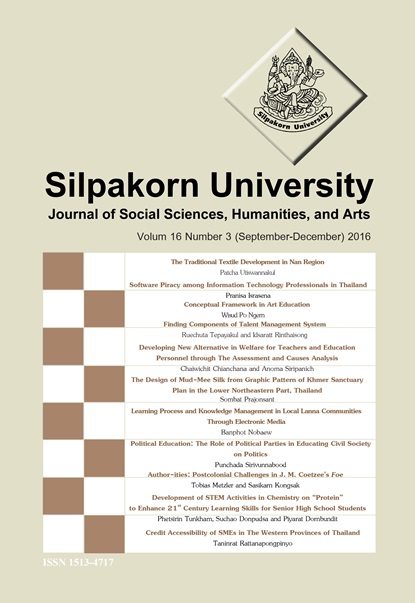Finding Components of Talent Management System
Main Article Content
Abstract
A system for managing talent has been shown to be a primary driver for the success of human resource management. After reviewing literature, it was found that an effective way to develop a talent management system was to identify its basic components. This study therefore aims to find certainty the components of talent management system in organizations. In order to ascertain these components, the literature review from secondary data were utilized. A criterion of choosing literature are inclusion and exclusion. The articles selected must be secondary literature which directly concerned talent management, human capital, and strategic human resource management from academic and electronic database. A total of 23 publications from 2009 until present were found useful to the study. The study is shown that the components of the talent management systemis the integrated system using the process of talent management including eight components: talent identification, talent recruitment, talent selection, talent development, talent retention, talent compensation management, talent performance management and talent succession planning. The proposed components identified should be confirmed through empirical research in a quantitative approach to develop the field of talent management.
Downloads
Article Details
All rights reserved. Apart from citations for the purposes of research, private study, or criticism and review,no part of this publication may be reproduced, stored or transmitted in any other form without prior written permission by the publisher.
References
accessed on July 4, 2013.
Armstrong, M. (2009) Armstrong’s Handbook of Human Resource Management Practice
11th ed., London and Philadelphia: Kogan Page Publishers
Beheshtifar, M., Nasab, H. Y. and Moghadam, M. N. (2012) Effective Talent Management:
A Vital Strategy to Organizational Success. International Journal of Academic Research in Business and Social Sciences 2(12): 227-234.
Boston Consulting Group & World Federation of People Management Association. (2014)
Creating People Advantages 2014-2015.
[Online URL: http//: www.andrh.fr/content/download/ 56782/.../CPA2014.pdf] accessed on August 2, 2015.
Breaugh, J. A. (2009) Recruiting and Attracting Talent: A Guide to Understanding and Managing the Recruitment Process. SHRM Foundation’s Effective Practice Guidelines Series 1-33.
Brooke, B., Pyron, D. A., Matthews, P. and Leisy, B. (2012) Paradigm Shift, Building a New Talent Management Model to Boost Growth. Ernst & Young. [Online URL: https://www.ey.com/Publication/ vwLUAssets/EY-paradigm-shift/$FILE/EY-paradigm-shift.pdf] accessed on July 4, 2013.
Collings, D. G. and Mellahi, K. (2009) Strategic Talent Management: A Review and Research Agenda. Human Resource Management Review 19(4): 304–313.
Florea, N. V. (2011) Using Branding to Attract, Recruit, and Retain Talented Staff.
Management & Marketing Journal 9(2): 283-297.
Hajimirarab, S. M., Nobar, M. N. and Ghalambor, M. A. (2011) Identifying and Improving the Talent Management Indicators. Business and Management Review 1(4): 1-8.
Jothibasu, S. (2015) A Study on Employees Perception towards Talent Management
Practices of Selected Information Technology Companies in Bengaluru District of Karnataka. Indian Streams Research Journal 5(8): 1-11.
Kehinde, J. S. (2012) Talent Management: Effect on Organizational Performance. Journal of Management Research 4(2): 178-186.
Khatri, P., Gupta, S., Gulati, K. and Chauhan, S. (2010) Talent Management in HR.
Journal of Management and Strategy 1(1): 39-46.
McShane, S. L. and Gilnow, M. A. Von. (2009) Organizational Behavior [Essentials], 2nd ed., New York: McGraw-Hill.
Noe, R., Hollenbeck, J. R., Gerhart, B. and Wright, P. M. (2010) Human Resource Management, 7th ed., New York: McGraw-Hill.
PageUp people. (2012) Talent Management Raising the Bar. [Online URL: https://dcb9maxnxelio.cloudfront.net/wp-content/uploads/2012/06/Talent-Management-Raising-the-Bar.pdf] accessed on September 9,2013.
Rao, V. G. (2014) A Study on Predictor Variables of Organizational Climate in Educational
Institutes. Acta Universitatis Danubius. Œconomica 10(6): 33-47.
Shafieian, G. (2014) Defining Talent Management Components. Advanced Computational Techniques in Electromagnetics 2014 (2014): 1-7. doi:10.5899/2014/acte-00182
Singh, S. and Dixit, P. K. (2011) Employee Retention: The Art of Keeping the People Who
Keep You in Business. VSRD International Journal of Business & Management Research 1(7): 441-448.
Tepwan, P. (2011) Strategic Human Resource Management: Concept & Strategy for a Competitive Advantage. Bangkok: Se-Education.
Tepwan, P. (2012) A-Z Modern Human Resource Management’s Tools. Bangkok: Se-Education.
Thakur, V. (2015) Talent Detection and Identification in Kabaddi. Indian Streams Research Journal 5(7): 1-5.
Wellins, R. S., Smith, A. B. and Erker, S. (2009) Nine Best Practices for Effective Talent Management. Development Dimensions International: 1-14.
Zamcu, E. G. (2014) Trends and Challenges in the Modern HRM–Talent Management. SEA-Practical Application of Science 2(4): 173-180.


